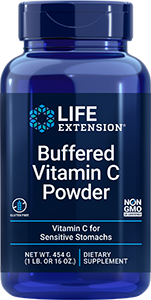| Stroke and cerebrovascular disease Multiple studies have found that a diet high in fruits and vegetables lowers risk of cerebrovascular disease and both ischemic and hemorrhagic stroke (Gariballa SE 2000; Sauvaget C et al 2003). Two major reviews recommended that public health policy promote increased dietary intake of antioxidant vitamin C, beta-carotene, vitamin E, B vitamins (including folate), potassium, calcium, magnesium, vitamin D, fiber, and omega-3 fatty acids to reduce risk of stroke (Gariballa SE 2000; Johnsen SP 2004). These vital nutrients can also be obtained through dietary supplements in conjunction with a healthy diet. Vitamin C, also known as ascorbic acid, is a water-soluble antioxidant that protects other compounds from oxidation by being oxidized itself. While it has been shown to lower blood pressure (Duffy SJ et al 1999), other long-term follow-up studies in human beings have found that vitamin C also reduces risk of cardiovascular and heart disease and stroke (Simon JA 1992; Enstrom JE et al 1992; Gale CR et al 1995). A small, well-designed study also found that giving antioxidant vitamins, particularly vitamin C, within 12 hours of an ischemic stroke increased antioxidant capacity, reduced inflammation, and reduced the oxidation of dangerous lipids (Ullegaddi R et al 2005). An earlier, 20-year follow-up study reported that higher vitamin C concentrations reduced incidence of both ischemic and hemorrhagic stroke (Yokoyama T et al 2000). Another study examined the benefit of vitamin C in overweight men with high blood pressure and found that low plasma levels of vitamin C were associated with increased risk of stroke (Kurl S et al 2002). Although vitamin C provides cerebrovascular benefits when taken alone (Hirvonen T et al 2000), studies have shown that it may be more powerful when combined with other nutrients, vitamins, minerals, and antioxidants (Galley HF et al 1997; Sacks FM et al 2001; Fotherby MD et al 2000; Toivanen JL 1987; Hajjar IM et al 2001). | Bio-identical Hormone Replacement Therapy (BHRT) Seminar
February 28-March 2, 2008, Harrah’s Las Vegas, Nevada The International Hormone Society & the American Academy of Anti-Aging Medicine is proud to present “A Practical Application of Treating Adult Hormone Deficiencies”- (Advanced course). If you are interested in learning more about the use of Hormone Replacement in age management using bio-identical hormone replacement for yourself and your patients, we highly recommend this course! This seminar will present the data behind current treatments of aging, and will offer practical treatment programs for your patient, as well as for your own personal health. The program will be presented by David Brownstein MD, Ron Rothenberg MD, Thierry Hertoghe MD, a fourth generation practicing endocrinology physician from Belgium, and Jonathan Wright MD, America’s top physicians in bioidentical hormone replacement will share the stage in the latest treatments in nutrition and hormone therapy. All physicians are practicing physicians and considered some of the leading bio-identical hormone specialists who are currently treating thousands of patients with these current treatments at their own clinics. This course will cover: - FDA approved human growth hormone replacement in the adult GH deficient patient
- Testosterone replacement for men and women.
- Oxytocin, iodine and thyroid comprehensive presentations
- Nutraceuticals and hormone advanced therapies
- Bioidentical estradiol-estriol and progesterone replacement.
- DHEA, cortisol, thyroid, melatonin, parathyroid
- Hormones and disease states- sexual health-heart hormones-osteoporosis-cancer-sleep disorder
- Question and answers for your problem patients
- Hormones and disease states- sexual health-heart hormones-osteoporosis-cancer-sleep disorder
To register, call 1-866-444-9475 or visit www.ucprx.com
https://www.lifeextension.com/event |
















